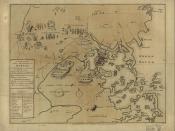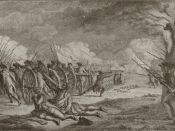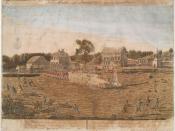American had always relished their freedom and their right to govern themselves. When these rights are taken away, the will to fight to regain their right develops. As early as the colonial era, this mentality existed. In the tow decades before the American Revolutionary War, a change occurred in the American opinion towards the British and colonial governments.
The British were quite lenient when they first colonized their section of North America (the most lenient of all countries in fact). They gave many of the rights to colonists as they gave to their own citizens. The Navigation Acts of the 1650s, although they placed some restrictions on colonial trade by designating certain goods that could only be traded with England, for example, only were used to enforce the English policy of mercantilism on its colonies. This policy was when the colonists provided raw materials for the mother country England and created much profit for England.
Other than this a lenient policy known as salutary neglect (allowing the colonies to ÃÂgrow upÃÂ on their own) to which the colonies grew accustomed.
The colonists accepted many forms of English government. The governor was like the King. The higher assembly was like the House of Lords and advised the governor, the lower assemble was like the House of Commons. This lower assembly played a major part in the lives of the colonists for his was the part that was elected by them. They had the power to the purse, the money to pay the higher official s and used it to regulate good and bad officials. This assembly gave the colonists actual representation rather than virtual representation (they were not being represented by men living in another country who nothing of their needs).
This period of salutary neglect was pretty much taken for granted until the French and Indian War ended in 1763. with this victory for the English came the beginning of defeat for the colonists. A huge debt was created, the responsibility to pay it was extended to the colonists. The first problem came up with the Proclamation Line of 1763 which cut off western expansion for colonists past the Appalachian Mountains. Although this didnÃÂt hurt the colonial governments in any way, it did show how the British were beginning to cut down the colonistsÃÂ freedom. After, in 1764 the first part of the Grenville Tax Program began ÃÂ the Sugar Act. Its intent was to raise revenue for England and tighten the Navigation Acts previously mentioned. The colonists saw it as a threat to their actual representation and it hurt them financially. They began to play with the idea of having no importation agreements to retaliate when England passed the Currency Act. This hurt debtors because it caused them to have to pay with hard money.
In 1765 the Stamp Act greatly influenced the colonists. With it came a tax on all printed materials which affected merchants and almost all the colonists. Attempts for retaliation in the form of the Sons of Liberty (a militant group which terrorized many), nonimportation agreements (boycotts), and printed material succeeded. The Declaration of Rights and Grievances was written to say that the only reason that colonists would obey England now was because it was in the best interest of both. The Stamp Act Congress formed, one of the first assemblies to get England to listen to the colonists and succeeded in the repeal. But to prove their superiority of Parliament the Declaratory Act made sure colonists knew England was in control. Because of the circular letter in the colonies and various forms of town meetings which the new tax man Townshend felt were going to hurt England (one of the first examples of rights being taken away). Writs of assistance or blank search warrants got their start in 1767 and colonistsÃÂ constitutional rights were on teh way out.
In 1770 the first bloodshed, the Boston Massacre, occurred, when sentries were shot by the common people. In 1773 the Boston Tea Party occurred because of a tax on tea. Although the tax was actually lower many colonists saw it as part of the power struggle to maintain actual representation so they threw the tea overboard.
This action resulted in the Intolerable Acts which were basically aimed at Boston. They closed the ports, took away the town meeting (their colonial government). Made mandatory quartering acts (which was against their rights to not have to house soldiers during a time of peace). Although Britain hoped this would get their money back little did they realize the retaliation would cause the Battle of Lexington and Concord where innocent colonial militiamen were shot in April 1775 (even though British blood was spilled as well). It was like the warning bell.
In 1774, the colonists attempted to regain their government rights by establishing the First Continental Congress. Then they discussed how upset they were with English policies and attempted to list grievances. The desire to break away was NOT there, they wanted to get their rights back. The Battle of Lexington and Concord occurred and then came the Second Congress in May 1775. There, they picked George Washington as head of the Army and yet still did not want to break. The Olive Branch Petition was their last attempt for peace.
It wasnÃÂt until Thomas Paine with his Common Sense (1776) that colonists began to see the need to break away from the repressive rule of the English government. Thomas Jefferson in his Declaration of Independence incorporated PaineÃÂs beliefs and those of John Locke with the compact theory of government where the power of the government comes from the people and to take away this power may result in rebellion.
The colonists wanted to be able to rule themselves. The new government (1781-89) set up under the Articles of Confederation in which states had rights shows this desire.
Bibliography:The American Pageant, Twelfth Edition, by David Kennedy, Lizath Cohen, Thomas A. Bailey





